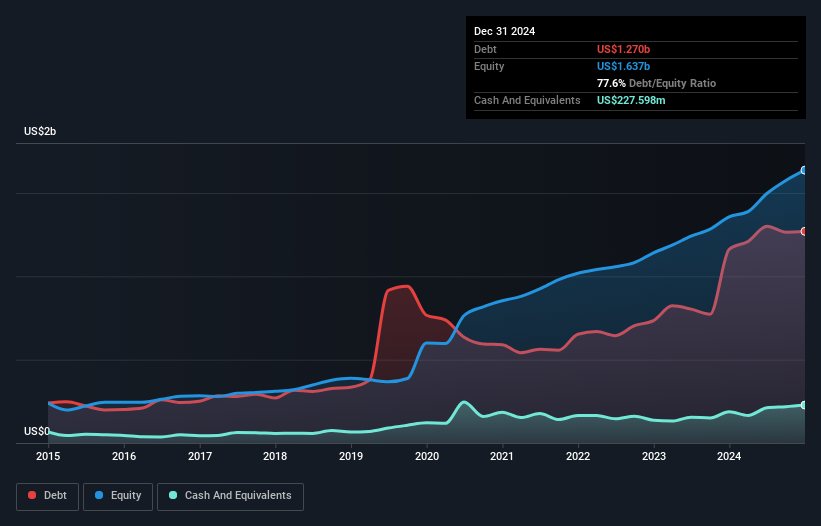Howard Marks put it nicely when he said that, rather than worrying about share price volatility, 'The possibility of permanent loss is the risk I worry about... and every practical investor I know worries about.' It's only natural to consider a company's balance sheet when you examine how risky it is, since debt is often involved when a business collapses. Importantly, FirstService Corporation (TSE:FSV) does carry debt. But is this debt a concern to shareholders?
What Risk Does Debt Bring?
Generally speaking, debt only becomes a real problem when a company can't easily pay it off, either by raising capital or with its own cash flow. Part and parcel of capitalism is the process of 'creative destruction' where failed businesses are mercilessly liquidated by their bankers. However, a more common (but still painful) scenario is that it has to raise new equity capital at a low price, thus permanently diluting shareholders. Having said that, the most common situation is where a company manages its debt reasonably well - and to its own advantage. When we examine debt levels, we first consider both cash and debt levels, together.
What Is FirstService's Debt?
You can click the graphic below for the historical numbers, but it shows that as of December 2024 FirstService had US$1.27b of debt, an increase on US$1.16b, over one year. However, it does have US$227.6m in cash offsetting this, leading to net debt of about US$1.04b.

A Look At FirstService's Liabilities
The latest balance sheet data shows that FirstService had liabilities of US$850.8m due within a year, and liabilities of US$1.71b falling due after that. Offsetting these obligations, it had cash of US$227.6m as well as receivables valued at US$956.9m due within 12 months. So its liabilities total US$1.37b more than the combination of its cash and short-term receivables.
Given FirstService has a market capitalization of US$7.91b, it's hard to believe these liabilities pose much threat. Having said that, it's clear that we should continue to monitor its balance sheet, lest it change for the worse.
See our latest analysis for FirstService
In order to size up a company's debt relative to its earnings, we calculate its net debt divided by its earnings before interest, tax, depreciation, and amortization (EBITDA) and its earnings before interest and tax (EBIT) divided by its interest expense (its interest cover). This way, we consider both the absolute quantum of the debt, as well as the interest rates paid on it.
FirstService has net debt worth 2.1 times EBITDA, which isn't too much, but its interest cover looks a bit on the low side, with EBIT at only 3.9 times the interest expense. While these numbers do not alarm us, it's worth noting that the cost of the company's debt is having a real impact. Also relevant is that FirstService has grown its EBIT by a very respectable 21% in the last year, thus enhancing its ability to pay down debt. When analysing debt levels, the balance sheet is the obvious place to start. But ultimately the future profitability of the business will decide if FirstService can strengthen its balance sheet over time. So if you want to see what the professionals think, you might find this free report on analyst profit forecasts to be interesting.
Finally, while the tax-man may adore accounting profits, lenders only accept cold hard cash. So we always check how much of that EBIT is translated into free cash flow. In the last three years, FirstService's free cash flow amounted to 48% of its EBIT, less than we'd expect. That's not great, when it comes to paying down debt.
Our View
When it comes to the balance sheet, the standout positive for FirstService was the fact that it seems able to grow its EBIT confidently. However, our other observations weren't so heartening. For example, its interest cover makes us a little nervous about its debt. When we consider all the elements mentioned above, it seems to us that FirstService is managing its debt quite well. Having said that, the load is sufficiently heavy that we would recommend any shareholders keep a close eye on it. The balance sheet is clearly the area to focus on when you are analysing debt. However, not all investment risk resides within the balance sheet - far from it. For instance, we've identified 2 warning signs for FirstService that you should be aware of.
Of course, if you're the type of investor who prefers buying stocks without the burden of debt, then don't hesitate to discover our exclusive list of net cash growth stocks, today.
New: AI Stock Screener & Alerts
Our new AI Stock Screener scans the market every day to uncover opportunities.
• Dividend Powerhouses (3%+ Yield)
• Undervalued Small Caps with Insider Buying
• High growth Tech and AI Companies
Or build your own from over 50 metrics.
Have feedback on this article? Concerned about the content? Get in touch with us directly. Alternatively, email editorial-team (at) simplywallst.com.
This article by Simply Wall St is general in nature. We provide commentary based on historical data and analyst forecasts only using an unbiased methodology and our articles are not intended to be financial advice. It does not constitute a recommendation to buy or sell any stock, and does not take account of your objectives, or your financial situation. We aim to bring you long-term focused analysis driven by fundamental data. Note that our analysis may not factor in the latest price-sensitive company announcements or qualitative material. Simply Wall St has no position in any stocks mentioned.
About TSX:FSV
FirstService
Provides residential property management and other essential property services to residential and commercial customers in the United States and Canada.
Solid track record with adequate balance sheet.
Similar Companies
Market Insights
Community Narratives



